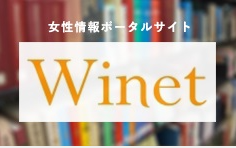Cooperation with JICA
- HOME
- International Cooperation
- Cooperation with JICA
- FY2020 Knowledge Co-creation Program "Promotion of Networking among ASEAN Countries on Anti-Trafficking in Persons”
Cooperation with JICA
- Event Report
-
FY2020 Knowledge Co-creation Program "Promotion of Networking among ASEAN Countries on Anti-Trafficking in Persons”
Date:November 20, 2020 / January 28-29, 2021
The purpose of this online seminar was to mutually learn from one another about harm from trafficking in persons that immigrant workers and others have faced during the COVID-19 pandemic in each countries and the measures respective countries have promoted to combat it, and to deepen the networks.
The seminar consisted of a Live Orientation held on November 20, an On-demand Learning Course, and 2 days Live Seminars on the topics of “Immigrant Workers and Trafficking in Persons” and “Online Sexual Exploitation” held on January 28 and 29. In addition to 22 attendees from 6 countries, interested organizations and experts in Japan and staff from JICA’s regional offices joined the seminar as the expanded participants, and lively discussions took place.
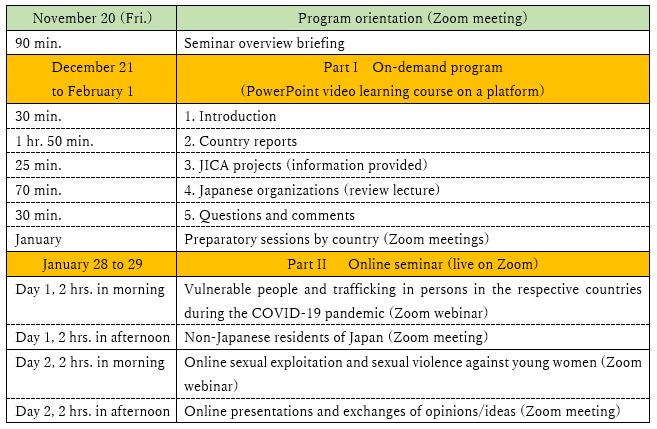
November 20 (Fri.) Orientation from 11:30 to 13:00
Online live orientation over Zoom was hosted from NWEC conference room connecting 22 seminar participants in six countries as well as regional office staff. Because of the time differences, the event started at 11:30 in Japan, but 8:30 in Myanmar, 9:00 in Thailand, Vietnam, Laos, and Cambodia, and 10:00 in the Philippines. Attendees were given briefings on the schedule of the two-month-long seminar, use of the on-demand platform, and their online assignments.
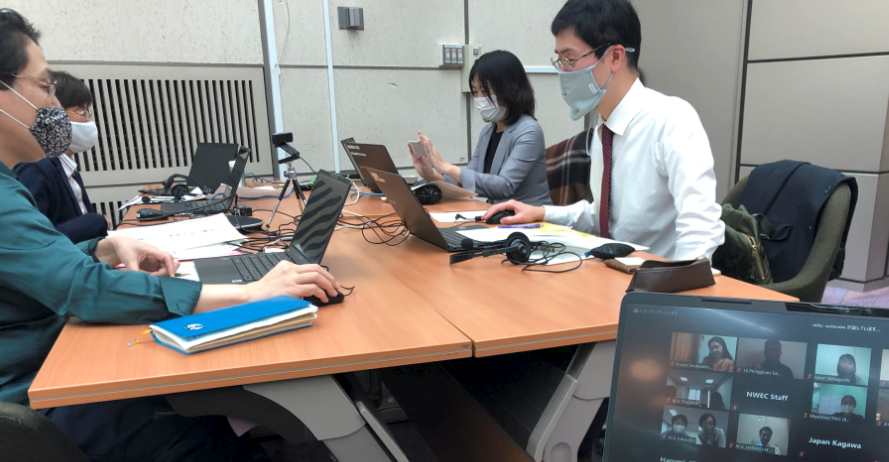 NWEC Main Conference Room
NWEC Main Conference Room
 Online orientation
Online orientation
December 20 (Mon.) to February 1 (Mon.) On-Demand Learning Course
On-Demand Learning Course included “1. Introductions of seminar participants and expanded participation members,” “2. Country Reports,” “3. JICA Project Profiles (Thailand, Vietnam, and Myanmar)”, “4. Overview of Initiatives by Organizations in Japan,” and “5. For Questions & Comments,” with which seminar participants and expanded participation members could learn about conditions in each countries and efforts by different organizations at their convenience.
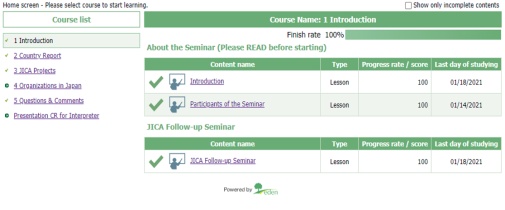 Online platform screen
Online platform screen
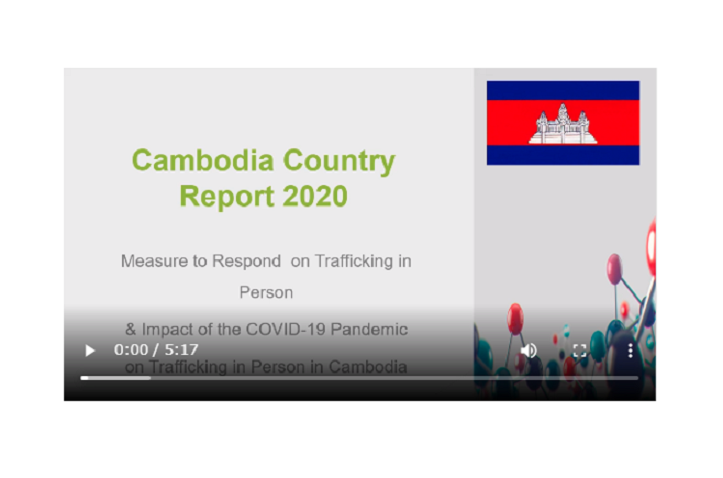 Country Report presentations (Cambodia)
Country Report presentations (Cambodia)
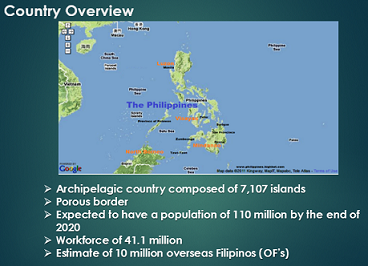 Country Report presentations (Philippines)
Country Report presentations (Philippines)
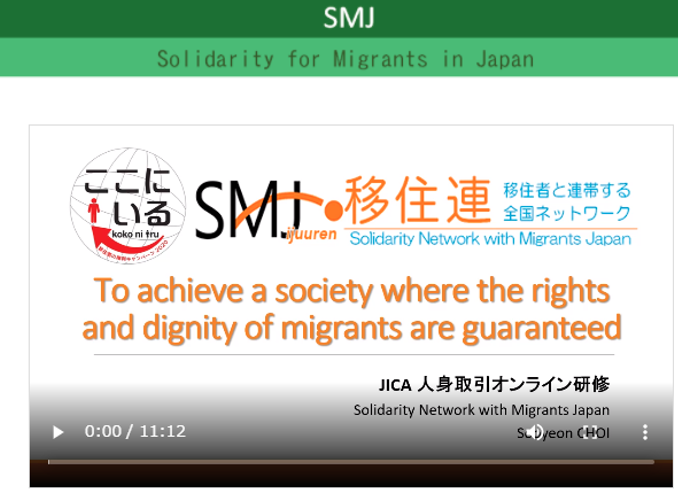 Profiles of Organizations in Japan (Solidarity Network with Migrants Japan)
Profiles of Organizations in Japan (Solidarity Network with Migrants Japan)
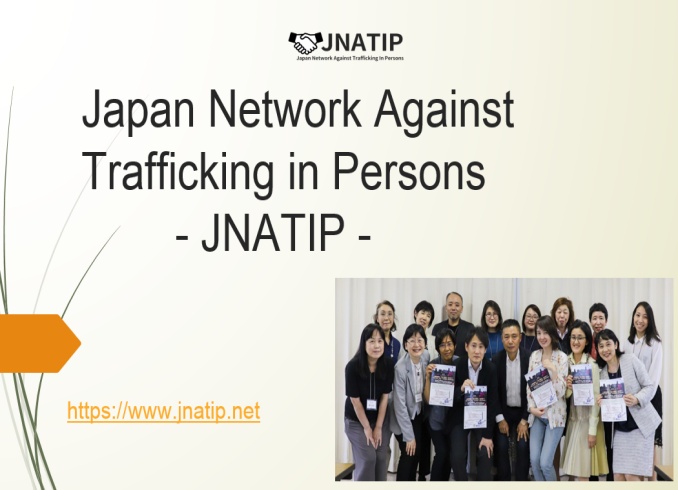 Profiles of Organizations in Japan (JNATIP)
Profiles of Organizations in Japan (JNATIP)
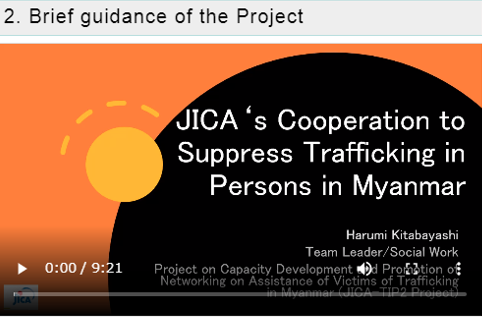 JICA Project Profiles (Myanmar)
JICA Project Profiles (Myanmar)
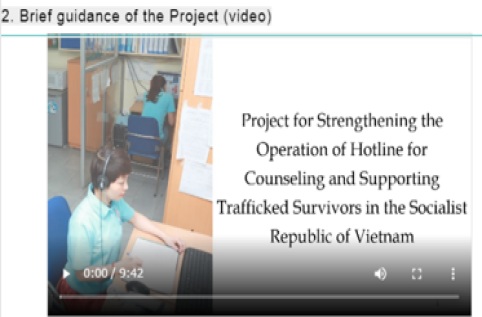 JICA Project Profiles (Myanmar)
JICA Project Profiles (Myanmar)
January 28 (Thur.) and 29 (Fri.) Live ZOOM Seminar
Day 1
Morning session was devoted to the topic of “Vulnerable people and trafficking in persons in the respective countries during the COVID-19 pandemic.” Participants from six countries gave reports on the latest state of affairs of harm caused by trafficking in persons and issues during the coronavirus pandemic in their countries.
Although the degrees of the damage, e.g. the numbers of infected and dead, and government measures to combat it differed from country to country, common issues cited were that the economic impact has been enormous in sectors where there are many women such as tourism and healthcare/medical services, and that immigrant women, who are particularly vulnerable, and women responsible for much unpaid work, have had to shoulder especially large shares of the burden.
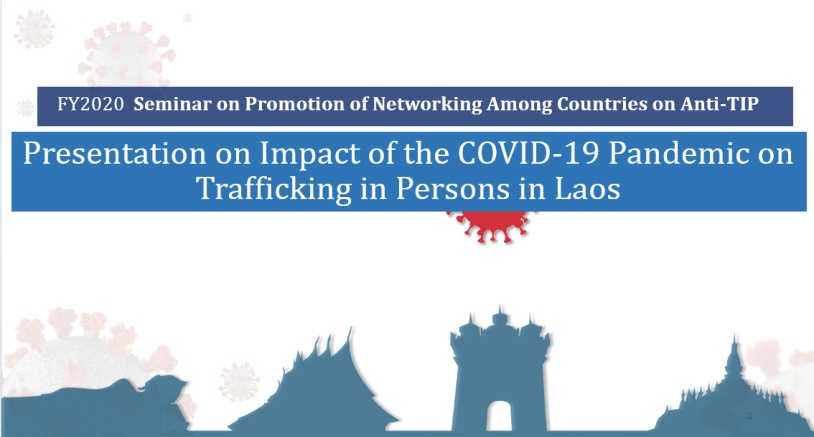 Country Report presentation (Laos)
Country Report presentation (Laos)
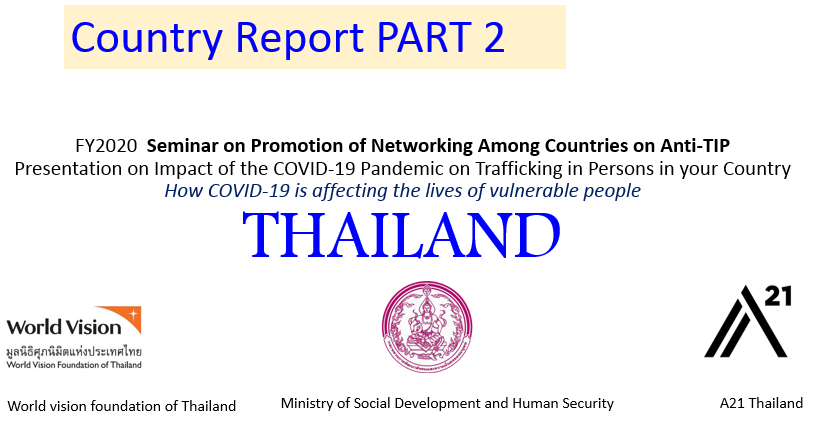 Country Report presentation (Thailand)
Country Report presentation (Thailand)
In the afternoon session, support-related organizations in Japan reported on the difficulties that non-Japanese residents have faced during the COVID-19 pandemic.
The Solidarity Network with Migrants Japan presented a report on emergency support fund activities and the difficulties that immigrants and refugees in Japan have faced, including the loss of employment opportunities and economic difficulties stemming from an inability to return to their home countries. The Yorisoi Hotline, Ichiryu-kai, the Thai Network in Japan, Waelaa-Waaree, and other organizations that operate help hotlines for foreigners living in Japan and provide support via accompanying services gave reports about violence against foreign residents including domestic violence, the lack of easily understood information, and the difficulties of support activities themselves, among other such matters affecting them during the pandemic.
Day 2
In the morning of Day 2, presentations were given about efforts in Japan and Thailand on the topics of sexual exploitation and sexual violence in cyber space against young women and children.
From Japan, the NPO PAPS reported on the realities of harm done to young people by having sexually explicit images taken against their will spread on the internet and explained PAPS’s support activities for the victims.
From Thailand, officer of the Thai police taskforce on online sexual exploitation and abuse of children and the HUG Project founder Booms Mosby made a presentation on their collaborative activities to tackle the grave issue. They work together from investigations to the taking of victims into protective custody and provide long term support for the children. They have taken over 100 children into protective custody during the lockdown.
In the afternoon, participants gathered by country in breakout rooms on Zoom or in JICA offices, and spent 30 minutes discussing Action Plans.
In their presentation, participants reported that they were able to learn from one another about COVID-19 situation in respective countries and different initiatives. Many stressed the importance of sharing information and data in ASEAN, and the needs to provide training for staffs to improve their skills further, etc.
Online seminar joined by over 70 people from seven countries including Japan, was an opportunity to share with others that while they face universal problems related to the pandemic, there are also circumstances and issues that differ from country to country. Attendees were able to reaffirm the importance of making cooperative ties among them even stronger. The online seminar had concluded with attendees voicing their hope that they will all be able to meet in person in a future event.
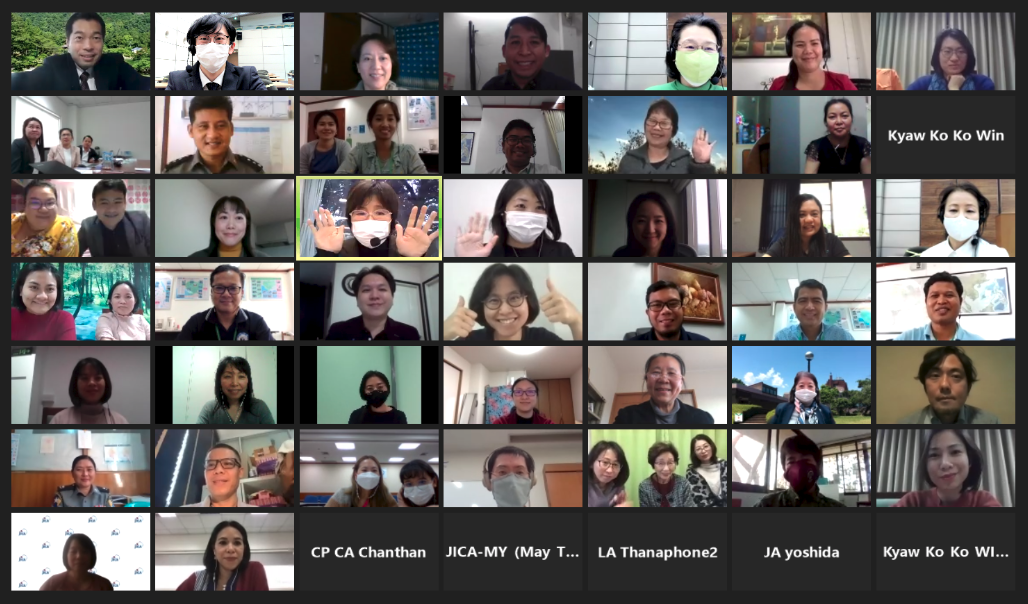 Commemorative photograph (seminar attendees, expanded participation members, JICA and NWEC staff)
Commemorative photograph (seminar attendees, expanded participation members, JICA and NWEC staff)
Lastly, we sincerely thank all the organizations and people who gave their invaluable help in creating the online presentation materials as well as support to carry out this online seminar.
International Cooperation
- International Seminar
- FY2019 Seminar for Gender Equality Officers and Women Leaders in the Asia Region
- FY2018 Seminar for Gender Equality Officers and Women Leaders in the Asia Region
- FY2017 Seminar for Gender Equality Officers and Women Leaders in the Asia Region
- FY2016 Seminar for Gender Equality Officers and Women Leaders in the Asia Region
- FY2015 Seminar for Gender Equality Officers and Women Leaders in the Asia Pacific Region
- FY2014 Seminar for Gender Equality Officers and Women Leaders in the Asia Pacific Region
- FY2013 Seminar for Gender Equality Officers and Women Leaders in the Asia Pacific Region
- FY2012 Seminar for Gender Equality Officers and Women Leaders in the Asia Pacific Region
- FY2011 Seminar for Gender Equality Officer and Women Leaders in the Asia Pacific Region
- FY2010 Empowerment Seminar for Women Leaders in the Asia Pacific Region
- FY2009 Empowerment Seminar for Women Leaders in the Asia Pacific Region Final Report
- FY2008 Empowerment Seminar for Women Leaders in the Asia Pacific Region
- FY2007 Empowerment Seminar for Women Leaders in the Asia Pacific Region
- FY2006 Empowerment Seminar for Women Leaders in the Asia Pacific Region
- NWEC Global Seminar
- FY2025 NWEC Global Seminar: Addressing Technology-Facilitated Gender Based Violence (TFGBV): Approaches to Eradicate the Invisible Harm
- FY2024 NWEC Global Seminar: Gender Equality and Care
- FY2023 NWEC Global Seminar: Gender Mainstreaming & Strengthening Institutional Mechanism with Gender Perspective
- FY2022 NWEC Global Seminar: Does Digital Technology Advance Gender Equality?
- FY2021 NWEC Global Seminar: Combating Gender-Based Violence – “Building Back Better” from the Covid-19 Crisis
- FY2020 NWEC Global Seminar: Covid-19 and Gender
- FY2019 NWEC Global Seminar: Gender and Media
- FY2018 NWEC Global Seminar: Promotion of the Advancement of Women - What Japan can learn from Iceland about Gender Equality?
- FY2017 NWEC Global Seminar: Promotion for Advancement of Women Lessons from Germany
- FY2016 NWEC Global Seminar: Promotion for Advancement of Women –Lessons from Europe
- FY2015 International Symposium: Gender Equality and Women's Empowerment
- FY2014 International Symposium: Keys to Diversity and Women's Leadership
- FY2013 NWEC International Symposium:Gender Equality for Men
- FY2012 NWEC International Symposium:To Make a Society without Violence against Women a Reality
- FY2011 NWEC International Symposium
- FY2010 International Forum for Women's Empowerment
- FY2009 International Forum for Women's Empowerment
- FY2008 International Forum for Women's Empowerment Final Report3
- FY2008 International Forum for Women's Empowerment Final Report2
- FY2008 International Forum for Women's Empowerment Final Report1
- Cooperation with JICA
- FY2025 Knowledge Co-Creation Program (KCCP): "Promotion of Global Networking on Anti-Trafficking in Persons"
- FY2025 Knowledge Co-Creation Program "Eradicating Sexual and Gender-Based Violence (SGBV)"
- FY2025 Knowledge Co-Creation Program: Bangladesh “Strengthening Capacity to Address Gender-Based Violence"
- FY2024 Knowledge Co-Creation Program on "Promotion of Global Networking on Anti-Trafficking in Persons"
- FY2024 Knowledge Co-Creation Program "Eradicating Sexual and Gender-Based Violence (SGBV)"
- FY2023 Knowledge Co-creation Program "Promotion of Networking among ASEAN Countries on Anti-Trafficking in Persons”
- FY2023 Knowledge Co-Creation Program "Eradicating Sexual and Gender-Based Violence (SGBV)"
- FY2022 Knowledge Co-creation Program "Promotion of Networking among ASEAN Countries on Anti-Trafficking in Persons”
- FY2022 Knowledge Co-Creation Program "Eradicating Sexual and Gender-Based Violence (SGBV)"
- FY2021 Knowledge Co-creation Program "Promotion of Networking among ASEAN Countries on Anti-Trafficking in Persons”
- FY2020 Knowledge Co-creation Program "Promotion of Networking among ASEAN Countries on Anti-Trafficking in Persons”
- FY2019 Knowledge Co-creation Program "Promotion of Networking among ASEAN Countries on Anti-Trafficking in Persons”
- FY2018 Knowledge Co-creation Program "Promotion of Networking among ASEAN Countries on Anti-Trafficking in Persons”
- Issue-specific Training “Seminar on Promotiom of Networking among ASEAN Countries on Anti-Trafficking in Persons”
- Basic Information-Gathering Survey/Workshop Seminar on the Economic Independence for Women in Central America and the Caribbean (El Salvador/Dominican Republic)
- Regional Gender Seminar in Central and South America
- 2015 Issue-specific Training "Seminar on Promotion of Networking among Asian Countries on Anti-Trafficking in Persons"
- Seminar on the Promotion of Education for Girls and Women II
- International Conference/International Exchange
- Online meeting with Seisen International School elementary students
- Visitor: Mansfield Fellows
- Visitor:JICA Knowledge Co-Creation Program (KCCP) on "Women's Empowerment through Business for Central American Integration System (SICA) Member Countries"
- The 68th Session of the Commission on the Status of Women
- Visitor: Madam Sustjie Mbumba, First Lady of the Republic of Namibia
- Workshop of commemorating the donation of the Beate Shirota Gordon archive materials
- Meeting with Korean Women’s Development Institute (KWDI)
- The Coalition of Finnish Women's Associations (NYTKIS) Secretary General Ms. KAKKOLA’s Courtesy Call to Foreign Minister KAMIKAWA
- The Coalition of Finnish Women's Associations (NYTKIS) Secretary General Ms. KAKKOLA’s Japan Visit Program
- The 67th Session of the Commission on the Status of Women
- NGO CSW67 Forum
- Webinar with Korean Women’s Development Institute (KWDI)
- The 66th Session of the Commission on the Status of Women (Hybrid format)
- Online meeting with international graduate students from the Appropriate Technology course at the University of Tsukuba
- The 65th session of the Commission on the Status of Women
- Lecture "The Beate Sirota Gordon Archives at Mills College"
- Participation in 2nd AGenT
- The 64th session of the Commission on the Status of Women
- Dr. Wang from National Taiwan University visits NWEC
- Japan Network of Women Engineers and Scientists and The Japan Inter-Society Liaison Association Committee for Promoting Equal Participation of Men and Women in Science and Engineering: 9th Japan Korea China Women Leaders Forum for Science & Technology
- Researcher from the KWDI visits NWEC
- Visit by a delegation from the Socialist Republic of Vietnam Ministry of National Defense
- Briefing on the Reykjavik Index for Leadership
- Women's Archives Center Exhibition "Beate Sirota Gordon and gender equality in Japanese Constitution"
- Visit from the Guangxi Women’s Federation
- Participation in the 63rd Session of the Commission on the Status of Women
- 7th Global Forum on Gender Statistics
- FY2018 International Symposium hosted by Korean Institute for Gender Equality Promotion and Education “Gender Equality at Schools”
- Visit from All-China Women’s Federation(ACWF)
- Participation in the 62nd Session of the Commission on the Status of Women
- The 14th KIGEPE International Symposium “Empowering Women’s Leadership: expanding influence and innovation”
- Participation in the 61st Session of the Commission on the Status of Women
- Visit from the Batis Center for Women
- 2011 Asia Women Eco-Science Forum (a forum of science and engineering leaders in Japan, China and Korea)
- The 60th Session of the Commission on the Status of Women
- The 59th Session of the United Nations Commission on the Status of Women
- The 58th Commission on the Status of Women
- The 57th Session of the United Nations Commission on the Status of Women
- International Symposium: Gender Awareness Education for Sustainable Development
- Thirtieth Anniversary Programs
- Attendance at the Ceremony Commemorating the 25th Anniversary of the Korean Women’s Development Institute (KWDI)
- Japanese-Filipino children (JFC)* from the Philippines-based NGO “DAWN” visit the Center
- Visitors from Abroad to NWEC
- Research report on Multicultural Family Support in South Korea
- Workshop on Gender and Education: Life-long Learning for Women’s Empowerment
- Lecture Delivered by a Visiting Researcher
- Connections: Bringing Together the Next Generation of Women Leaders in Science, Technology, Engineering and Mathematics
- Conclusion of Memorandum of Understanding on Exchange and Cooperation with the Ministry of Women's Affairs, Royal Government of Cambodia
- Visit to Japan by the Minister of Women’s Affairs of the Royal Government of Cambodia
- KIGEPE Delegation Visit
- Officials of Ministry of Information and Communications of the Socialist Republic of Vietnam visited NWEC
- The 56th Commission on the Status of Women
- Dr. Barker's visit
- Multidisciplinary Intellectual Exchange for Women Leaders from the United States, Japan, South Korea and the Philippines
- Courtesy visit to University of Hawai`i
- Delegation of Board for the Advancement of Women, Ministry of Finance of the Socialist Republic of Vietnam visited NWEC
- Visit Korean Women's Development Institute (KWDI)
- Report on Participation in the 5th World Social Forum on Migration
- A group led by the Vice President of the Korean Women's Development Institute visited NWEC
- A disaster management specialist from India visits the Center
- Visit to the Korean Institute for Gender Equality Promotion & Education (KIGEPE) and others
- Secretary of State, Ministry of Justice, Kingdom of Cambodia visited NWEC
- Research conducted in the Republic of the Philippines
- Research on the Comparative Study of the Gender Equality Policy in Southeast Asian Countries in the Kingdom of Cambodia
- Ochanomizu University and A Canadian Women’s Study Researcher visited NWEC
- Aigyung Yang, Research Fellow and Former Director of Strategy Board for Women Friendly Policies of the Korean Women's Development Institute (KWDI) Visits NWEC
- Delegation of the Ministry of Defense of the Socialist Republic of Vietnam visited NWEC
- Delegation from the Women and Development Center, of the Vietnam Women's Union, Visited NWEC
- The "7th Asia-Pacific Forum on Development and Gender" was held in Seoul, South Korea
- HOME
- International Cooperation
- Cooperation with JICA
- Cooperation with JICA
- FY2020 Knowledge Co-creation Program "Promotion of Networking among ASEAN Countries on Anti-Trafficking in Persons”

